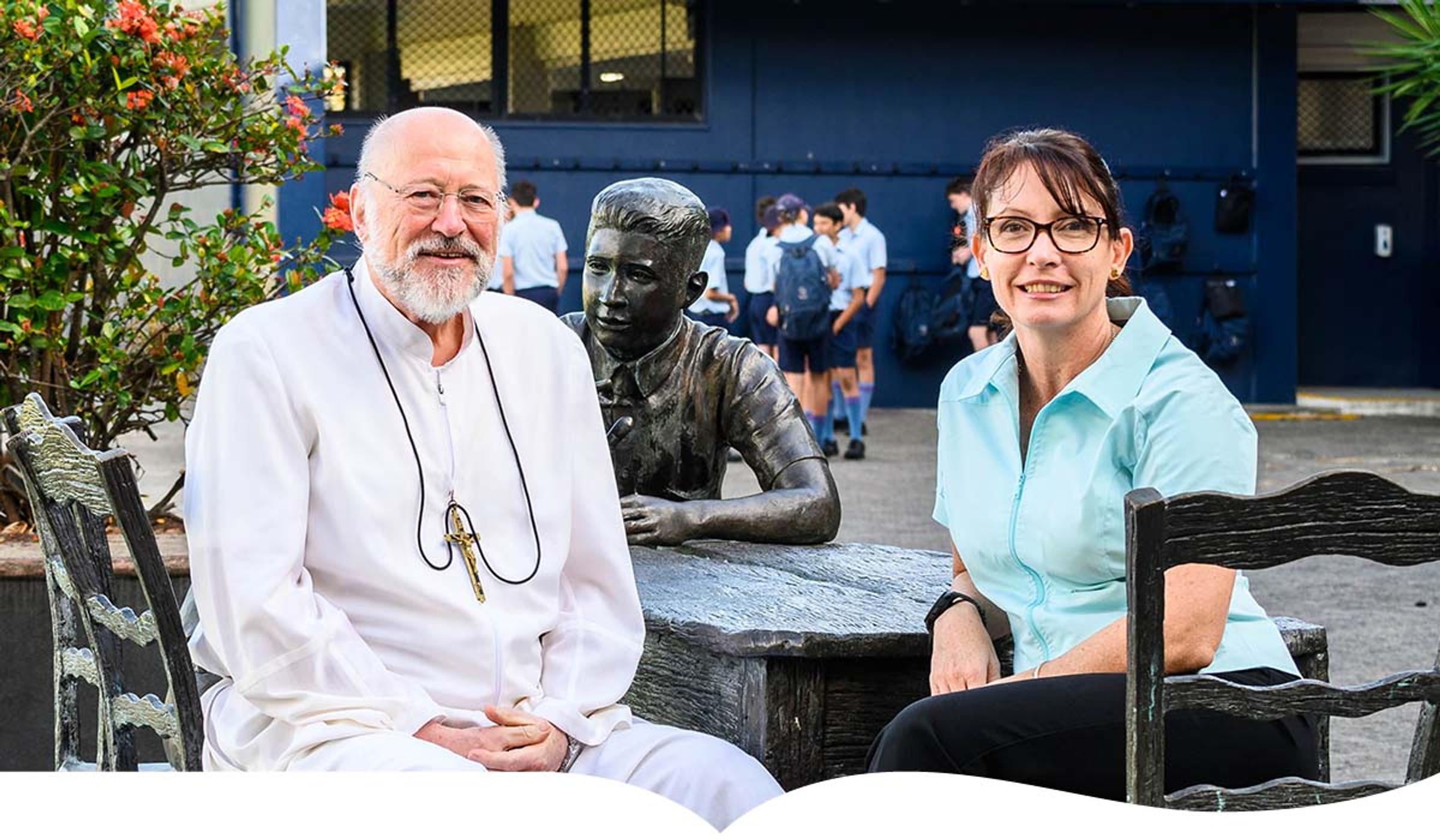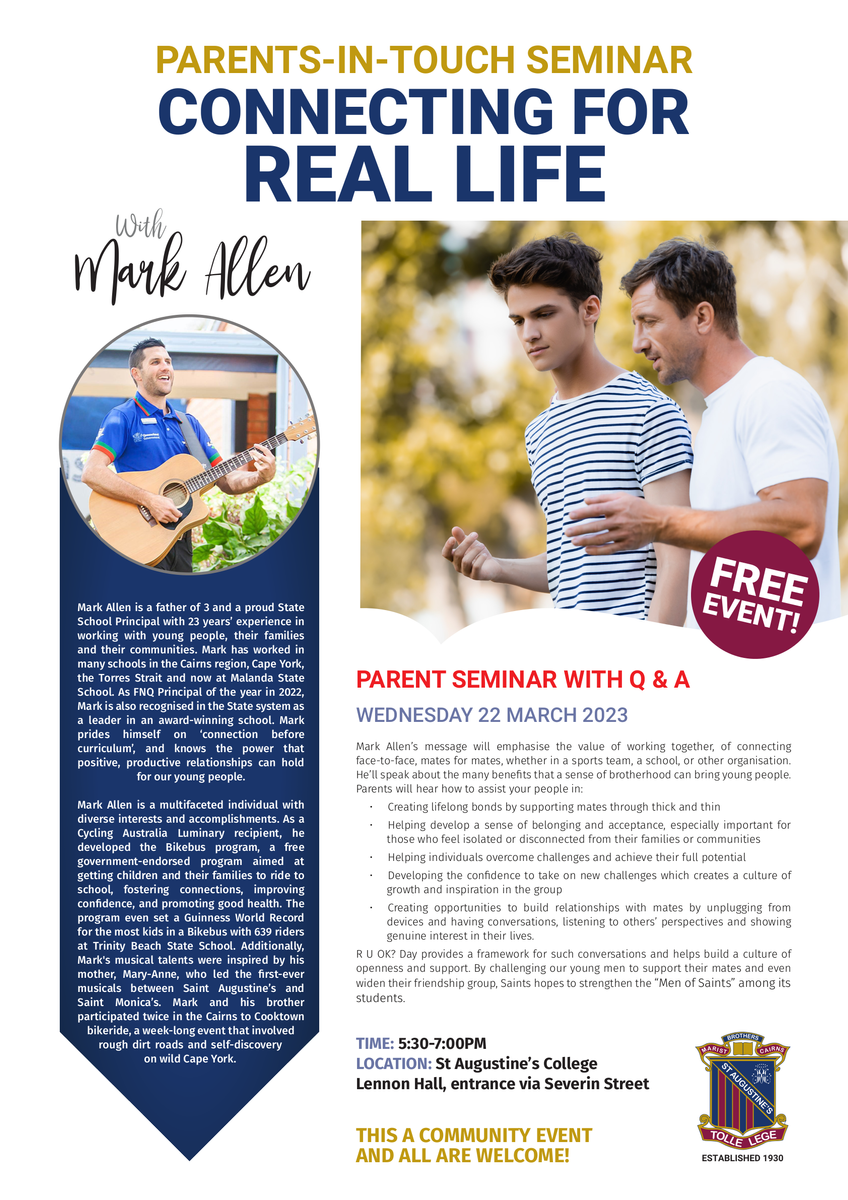COUNSELLING CONNECTIONS
News from College Counsellors Br Roger Vallance fms &
Mrs Marijke Keller

COUNSELLING CONNECTIONS
News from College Counsellors Br Roger Vallance fms &
Mrs Marijke Keller
Because the national date of R U OK? Day is in the middle of our end of year block exams, Saints celebrates R U OK? Day for our College community in week 9 of Term 1. This year we have Mr Mark Allen as guest speaker.
Mates for Mates Stronger Together
Mark Allen will speak to Parents Wednesday 22 March in Lennon Hall from 5:30 to 7pm. An experienced educator, Mark well understands the pressures and demands on families. His focus will be on practical means of nurturing bonds. There will be ample opportunities for questions. You are welcome to bring a friend. This is a free event. Access the flyer below and feel free to share it with your friends.


Thursday 23 March is our R U OK? Day
Our day starts early, as the pavement artists will be hard at work on our theme of “Mates for Mates” and “Stronger Together”. Pavement chalks will be supplied. There will be prizes for the best artwork, so please encourage your sons to add creativity to the themed drawings. Boys are encouraged to bring to school and wear once at school a silly hat and/or a silly tie.




Mark Allen will speak to the boys in assembly and there will be house activities to help reinforce the message that we need to look out for each other, support each other and help each other.
Safeonsocial.com
Vapes are, unfortunately, readily available and very accessible to teenagers (and in some cases tweens), as many are purchasing them through social media platforms. While vaping products were initially marketed as a safer alternative to smoking cigarettes, growing evidence suggests they are very harmful.
Vaping has become increasingly popular among Australian teenagers, with some studies indicating that over one in 10 high school students have tried vaping. A recent study by the National Drug and Alcohol Research Centre at the University of New South Wales has revealed that social media platforms allow Australian teenagers to easily purchase vaping products.
The study found that traditional retailers are no longer the main source of vaping products for teens. Instead, 28% of high school students buy these products through platforms such as Facebook, Instagram, Snapchat and Twitter. Disturbingly, 80% of these buyers were not asked to verify their age. This poses a great concern since vaping products contain nicotine, which is harmful and highly addictive for young people. Vaping product sellers advertise their wares on social media by using hashtags such as #vapeforsale or #vapesforsale. The unregulated nature of the vaping market on social media platforms raises additional concerns:
The Australian government took some steps to address the issue of teenagers buying vapes through social media. In 2019 legislation was passed to make it illegal to sell vaping products to minors, and in 2020, the government introduced new regulations that require all vaping products to be registered with the Therapeutic Goods Administration.
What parents and carers can do to help combat teens buying vapes through social media:
To report information about the suspected illegal sale of these products, please contact Crime Stoppers via https://www.crimestoppers.com.au
Additionally, The Sunday Mail, 10th March 2023, p.9 headlined that Premier Annastacia Palaszczuk is establishing an inquiry to investigate the scale and consequences of adolescent vaping in Queensland. Click here to read this story.
To contact Br Roger phone: 4052 9135 or email: brroger@cns.catholic.edu.au
To contact Ms Keller (Monday, Thursday and Friday) phone: 4052 9136 or email: mkeller@cns.catholic.edu.au